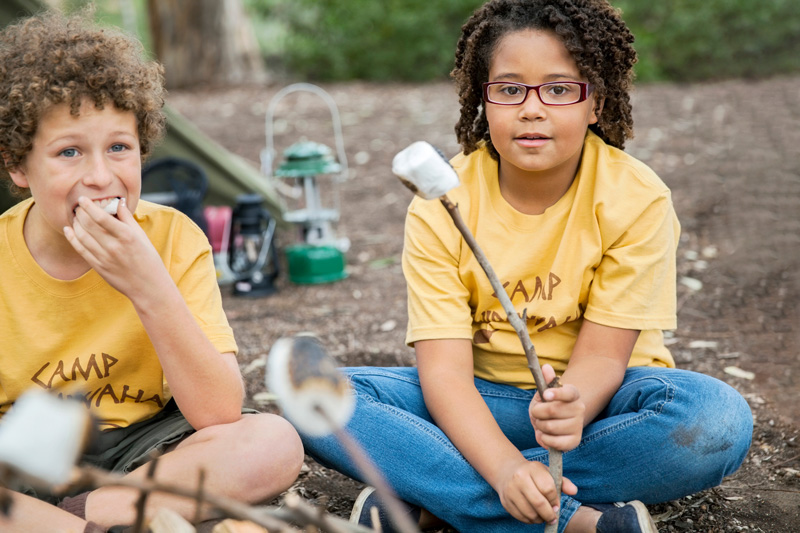While kids prepare and look forward to the fun of summer break, as a parent you may be feeling stressed about months of hectic schedules, impromptu events, and later bedtimes. Let’s face it, for parents, summer’s promise of fun can quickly become a difficult and stressful time.

For families with autistic children or children with intellectual/developmental disabilities (I/DD), the pressure felt by all parents can be even greater. We know that caregivers to autistic children and those with disabilities experience more stress (Biswas et al., 2015; Hayes & Watson, 2013); summertime changes to your family’s routines can amplify that.
The aim of this article is to provide some concrete, easy-to-implement strategies to help reduce stress and the unpredictability of summer on families.
As we come out of our COVID bubble and back into a relatively normal summer, many families are sending their kids to camp for the first time while others embark on yet another summer whirlwind. Let’s take a moment to celebrate the world opening again, with the worst of the pandemic apparently behind us.
Back in the spring of 2020, with the sudden onset of COVID, I was lucky to be given the challenge of developing virtual integrated summer camps for kids and adults with ASD or I/DD – as well as typically developing peers and siblings. That experience taught me about the value of summer camp for all kids and the special importance of summer camp for our ASD and I/DD population. Whether your child is participating in a summer day camp, summer school or residential summer camp, they will carry the learning and experiences with them for life.
Summer camp isn’t just about having fun. Studies have shown that summer camp experiences can improve social, behavioral and emotional skills in children (Flynn et al., 2019). If your children are heading off to camp this summer, below are a few tips to support them in making the most of the experience.
Please remember that each family is different. As a parent, you are the best source of information for supporting your child through change. Use strategies that have worked in the past to prepare them for changes to their routines. If any of these tips don’t work for you, don’t worry. You know what’s best for you and your child.
- Seek Recommendations – Summer camps usually open registration in the early spring – but if you’re still looking now, don’t worry: spots may still be available. Ask around for camps that have experience working with autistic children or those with I/DD. Many city programs will have “adaptive” summer camps or offer aides to those with additional needs to support integration in typical camps. Teachers, other parents, and care providers may know of options in your area. For those interested in residential sleep-away camps, many camps offer specialty programs based on specific needs or diagnoses.
- Align Schedules – When possible, find a camp that fits your schedule. As a mom of two young kids, I understand the stress and difficulty parents face navigating the ever-changing schedules of the summer. This is a practical concern that’s easy to overlook. Finding a camp that meets your scheduling needs may ultimately be more important than other considerations such as getting into the camp that all your child’s friends attend – or the one others say is “the best.”
- Embrace Novelty – Summer camps are a different environment than school, which makes them the perfect place for children to develop their social skills. The novel environment will support new and emerging social skills.
- Enjoy Yourself – Remember that camp isn’t just for kids! For parents and caregivers, camp can offer much needed respite time. Use that time to do things that are important to you and your wellbeing.
- Create A Schedule or Calendar – A schedule or calendar for the summer can help you manage any stress your child may be feeling. Use language or visuals they can read or understand. Choose images or stickers to represent an activity if your child can’t read. Mark each day’s activities on the calendar so they can see what to expect each day. Get in the habit of reviewing this daily. Some families like reviewing it every evening to plan for the next day, and some prefer it in the morning. Find what works for you and your child to reduce the stress of the unknown and build normalcy into the chaos of summer.
- Visit New Locations in Advance – If your child struggles with new locations, try visiting before the first day of camp or summer school. Walk around and point out familiar things and normalize the new things. “Oh look, they have a green playground, your school has a blue one. This is where you will be during the day, and this is where I will meet you afterwards in the afternoon.”
- Share Your Tips – Write up a list of activities or items that help calm your child if they become upset. Sharing this with the camp director is a great way to ease your mind and help them get to know your child. If your child has a behavior plan in place from school or other behavioral services, ask for a copy and send it to the camp ahead of time. If you can, put another copy in your child’s backpack on day one and point it out to the camp leaders.
- Communicate Practical Needs – Email the camp director ahead of time and set up a time to talk. Ask questions about how the camp handles any issues that are important to you, such as behavior, dietary needs, allergies, and medications. This will help you feel comfortable on day one that everyone is prepared to support your child.
- Go Easy on Yourself – Even the most prepared families will face challenges as they deal with changes in routines and plans. Continue to implement behavior and treatment plans with as much consistency as you can. Remember that parents are human and it’s okay to make mistakes or to be less consistent from time to time. It happens!
- Be Confident – You are the expert in your child. It is important that clinicians empower and support you in your parenting journey. You deserve support no matter your current capacity for implementing interventions or handling new situations. Continue to voice to your child’s various treatment teams or support people what you need and how they can support you. Parents and caregivers should be in the driver’s seat and feel the autonomy to advocate for their child and family. If this means relaxing or changing behavior plans, goal targets or appointment times to mold to the needs of summer, everyone involved should support your decisions and your family.
Your child deserves to choose their own path and engage in fun activities that interest them. Summer is a wonderful time for them to grow and learn from new experiences. The skills they use this summer will benefit them throughout their life. Studies have shown that social functioning can improve while at camp (Yang et al., 2021) – demonstrating the importance of the camp experience for individuals with disabilities. With a little preparation, these experiences can be available to everyone, without regard to disability.
Brianna Fitchett, MA, BCBA, is Vice President of Remote Care & Program Design at Catalight
Catalight provides access to innovative, individualized care services, clinical research and advocacy so people with developmental disabilities can choose their path. Visit catalight.org for more information.
References
Biswas, S., Moghaddam, N., & Tickle, A. (2015). What are the factors that influence parental stress when caring for a child with an intellectual disability? A critical literature review. International Journal of Developmental Disabilities, 61(3), 127–146. https://doi.org/10.1179/2047387714Y.0000000043
Flynn, R. M., Ricker, A. A., Dolezal, C., Kunin, M., & Mellins, C. A. (2019). Residential summer camp for youth with special needs: A longitudinal approach to investigating differences in social skills. Children and Youth Services Review, 96, 354–363. https://doi.org/10.1016/j.childyouth.2018.10.036
Hayes, S. A., & Watson, S. L. (2013). The Impact of Parenting Stress: A Meta-analysis of Studies Comparing the Experience of Parenting Stress in Parents of Children with and Without Autism Spectrum Disorder. Journal of Autism and Developmental Disorders, 43(3), 629–642. https://doi.org/10.1007/s10803-012-1604-y
Yang, J., Shafran, R., Bennett, S., & Jolly, A. (2021). An investigation into the psychosocial impact of therapeutic recreation summer camp for youth with serious illness and disability. Clinical Child Psychology and Psychiatry, 26(4), 1111–1123. https://doi.org/10.1177/13591045211028539






[…] Read More […]